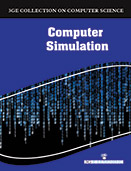
Computer simulation of random phenomena has become an indispensable tool in modern scientific investigations. So-called Monte Carlo computer approaches are now commonly used to promote understanding of probabilistic problems. Today, we have a fairly clear explanation of why the Monte Carlo method works namely, that for expectation values, the rapid increase in the number of configurations with energy is compensated for by the rapid decrease of the Boltzmann factor, leaving a narrow window of states that actually have to be explored. Computers’ random-number generators are now fully accepted and reasonably well understood. The most powerful and surprising feature that remains from this early calculation is the insight that using an inherently probabilistic algorithm can lead to an enormous compression in the number of computational steps required. Monte Carlo calculations use a random-number generator to simulate something else, often a system in thermodynamic equilibrium. By contrast, the molecular dynamics approach uses the computer to solve Newton’s equations of motion and follow the trajectories of all the particles in the system. Fermi, Pasta, and Ulam performed one of the first calculations of this kind.
This book illustrates computer simulation concepts and provides basic details about using discrete-event computer simulation for decision making. Computational science is beginning to play an important role in scientific research and development. Modern scientific research originally grounded in experiment and its theoretical interpretation is increasingly moving toward becoming a triad of experiment, theory, and computer simulation. This is because the analysis of simulations of complicated systems can be a portal to discovery of important but hitherto unnoticed simplifications and regularities. Computational tools play an important role in the design and testing of new engineering products, and simulation results form part of the basis for many policy decisions. Yet, computational science is not nearly as mature as experimental, theoretical, or engineering science.
This book is primarily intended for students as well as active researchers who want to learn about the new techniques of computational science should also benefit from this book.